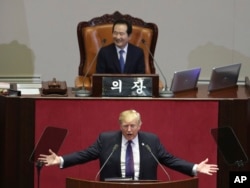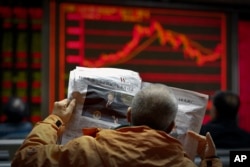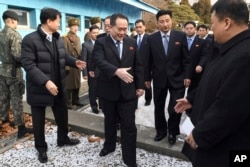After negotiating what seems to be an Olympics truce with North Korea, South Korean President Moon Jae-in now has a chance to test his outreach strategy to achieve the denuclearization of the Korean Peninsula through economic engagement.
“There is a very small window of opportunity for South Korea and the South Korean government understands this. So that is why they want to trap North Korea in this incentive cycle,” said Go Myong-Hyun, a North Korea analyst with the Asan Institute for Policy Studies in Seoul.
Conciliatory approach
Pyongyang’s agreement to participate in the upcoming PyeongChang Winter Olympics, to be held in South Korea in February, along with the U.S. decision to postpone joint military exercises for the duration of the games, has brought a needed pause to the continuous North Korean ballistic missile and nuclear tests.
Since he was elected in May of 2017, the liberal leader in Seoul has tried to temper U.S. President Donald Trump’s “maximum pressure” policy that seeks to coerce Pyongyang to unilaterally give up its nuclear deterrent through tough economic sanctions along with the credible threat of military force. Moon has supported strong sanctions but opposed preventive U.S. military action against the North that could possibly trigger deadly retaliation against millions living in the South, and even escalate into a regional nuclear war.
Moon’s more conciliatory approach is to reduce immediate tensions with North Korea through trust building measures. At the recent inter-Korean dialogue Pyongyang accepted Seoul’s invitation to join in the Olympic games and the two sides agreed to engage in further military talks to avoid the potential for conflict. Moon has also offered humanitarian aid, and suggested holding reunions for separated families.
Nuclear contention
However getting to the next level, to bring North Korea to the negotiation table for direct nuclear talks, will require more than inter-Korean dialogue.
“If we’re talking about denuclearization, the flipside of this is the North Koreans aren’t going to make a deal with South Koreans on their nuclear missile programs. North Korea is very clear who they’ll talk to about that, and that is the United States,” said John Delury, an Associate Professor at Yonsei University’s Graduate School of International Studies in Seoul.
North Korea has declared itself a non-negotiable nuclear weapons state while the U.S. insists Pyongyang must first commit to denuclearization before talks for economic aid and security guarantees can proceed.
In the inter-Korean talks Moon may try to negotiate a diplomatic breakthrough by offering to further postpone or reduce the U.S. led joint military drills in exchange for a North Korean concession to discuss denuclearization down the road, when its security concerns are resolved.
“I think South Korea will try to get from North Korea, some maybe just even hints of North Korea’s willingness of (addressing) denuclearization,” said Asan Institute analyst Go Myong-Hyun.
Economic engagement
The leadership in Pyongyang, Go said, may be looking for a deal, as the international sanctions on North Korea are imposing real economic pain and there is rising concern in Pyongyang that the U.S. might take military action if nuclear tests continue.
Sanctions currently make it difficult for South Korea to offer significant economic engagement incentives, such as reopening the jointly run Kaseong Industrial Complex that was shut down in 2016 over North Korea’s nuclear testing.
“The re-operation of the Kaesong Industrial Complex is a matter which will take more time. It will not be easy to hurry this, as talks on North Korea's nuclear issue are not proceeding,” said Kim Yong-hyun, a North Korean studies professor of Dongguk University.
For now the two Koreas are continuing talks about the North’s participation in the Olympics that may include possibly forming a united female hockey team. The hard choices remain further down the road.
Also this week, the U.S and Canada will host foreign ministers from around 20 nations in Vancouver to discuss ways to increase pressure on North Korea to end its nuclear program through further diplomatic and financial punitive measures. However China, North Korea’s influential ally and key trading partner, will not attend.
Youmi Kim in Seoul contributed to this report.










